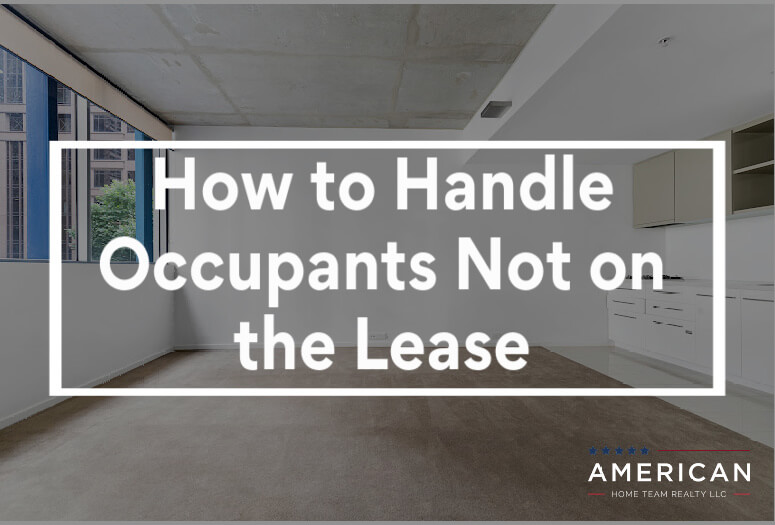Are they a guest or a tenant?
Here’s how to handle occupants not on the lease.
On the face of it (and even in the Florida Statutes), the definition of “tenant” seems pretty straightforward:
Tenant: “[A]ny person entitled to occupy a dwelling unit under a rental agreement.”
But as we all know, legal issues are rarely cut-and-dry, and many courtroom battles have been waged over this concept. While some of these cases involved sub-letters and squatters, the most common disputes are over people who started out as guests.
Sooner or later, every landlord finds themselves dealing with occupants not on the lease. All tenants have rights, but so do you! Here’s how to assert those rights and maintain control over your investment property.
What Exactly Is a Tenant?
At first glance, there seems to be a very strong distinction between “guest” and “tenant.” After all, one lives in your rental property and one doesn’t. But there are many places where this can fall apart under a strict legal eye.
What if they stay over a couple nights a week? Is that considered “living at the residence”? What if it’s a boyfriend or girlfriend who spends the night at your rental property more often than they do at their own house? If they are allowing a friend to crash on their couch for a month or two while they’re looking for an apartment, can that be considered tenancy?

When you think about it this way, it’s easy to see how many landlords could have occupants not on the lease that may actually have tenancy rights.
When Does a Guest Become a Tenant?
Ultimately, it doesn’t matter whether you consider a guest to be a tenant or not. If a legal argument can be made that they are entitled to tenant rights, you need to take steps to protect yourself.
Here are some questions you can ask to help determine if a guest is actually a tenant.
Are they paying rent?
It may come as a surprise to learn that—if the lease term is less than one year—verbal rental agreements are valid in Florida. What does this mean for you?
If you agree to accept money or services in exchange for allowing a guest to stay at your property, this is considered an informal (yet perfectly legal) rental agreement. Simply agreeing to the arrangement is enough to consider them a tenant; money doesn’t ever need to exchange hands.
As inconvenient as any guest might be, avoid accepting any money from them as compensation.

How often do they sleep over?
A guest who appears to be at your property more often than they are at their own place can reasonably be considered a tenant. This is especially true if they receive mail at your address or have brought in personal belongings.
Exceptions can be made for college-aged children who may be visiting during summer or winter breaks, parents who are in town to help with a new baby, or a babysitter who may occasionally provide overnight care.
If your lease agreement includes a guest policy (and hopefully it does!), you can use these guidelines to determine whether the guest is overstaying their welcome. One more reason not to use a basic lease agreement!
Why Does It Matter?
As a landlord, you have rights under Florida law, but so do your tenants…whether you’ve chosen them as tenants or not.
It’s hard enough to evict a tenant who signed the lease. How much more difficult do you think it is when there’s no written lease agreement to refer to? The legal headache is simply not worth it.
Every person who lives in your rental property is a risk. Your job as a landlord is to mitigate that risk in whatever way you can. You’ve probably heard horror stories about “dream tenants” who turned into a landlord’s nightmare. There is no guarantee that any tenant—authorized or not—will abide by the rules.

Dealing With Occupants Not On the Lease
What are your options when you have occupants not on the lease?
First, you can ask the guest to limit their overnight visits or (if they have already moved in) to move out.
Alternatively, you can simply accept that you have a new tenant and have them sign the lease (provided they pass a background check or whatever screening process you use for your tenants). Draw up a new lease agreement, raise the rent appropriately, and have all tenants sign it.
If the guest doesn’t wish to become an official tenant, you can have them sign a long-term guest agreement. This allows you to state in writing that the guest is not an official tenant and is not subject to Florida’s tenancy rights.
Finally, you can choose to evict the tenant but this should be a last resort. Evictions are complicated for everyone involved. If you are able to diffuse the situation in another way, it will be well worth it.
Keep Your Property In Your Hands
Every tenant is allowed to have an occasional guest, but there are times when the boundary between “guest” and “tenant” is crossed. But you don’t have to allow occupants not on the lease (and, for liability reasons, you shouldn’t).
Being a good landlord doesn’t mean keeping your tenants happy at all times. It means taking care of your investment and making decisions that make financial sense for your business.
If you have any questions about lease agreements or need some guidance about being a landlord, the team at American Home Team Realty can help. Give us a call to see what we can do for you.


